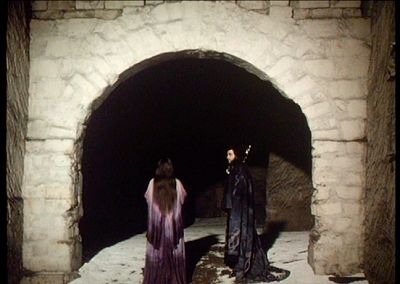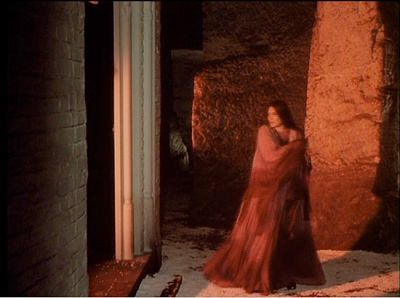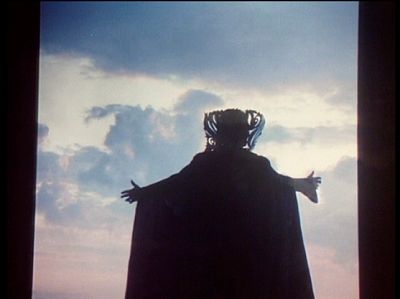First things first. This is a 1981 Unitel studio performance,
the singers lip-synching to Decca’s audio recording with Solti
and the LPO (nla). These hybrids are far from ideal, as I discovered
with Rolf Liebermann’s Orpheus in der Unterwelt (see review).
That 1960s performance is frankly risible at times and the mono
soundtrack is very disappointing. Thankfully this Bluebeard
is much more compelling, both musically and dramatically.
In the 1970s Hungarian-born
soprano Sylvia Sass was touted as the next Callas but after some
promising recitals, recordings and stage performances she dropped
out of sight. The similarities with Callas – according to those
who saw Sass perform – are striking. She certainly has a dramatic
intensity that recalls Callas at her smouldering best but, alas,
she also has the latter’s wayward voice. I recently sampled Sass’s
Hungaroton disc of Strauss lieder and found her occluded tone
and general unsteadiness very distressing.
Fortunately the Bluebeard
audio recording with Solti dates from her earlier career, so she
is in much better voice. Not having seen her perform I was curious
as to whether the comparisons with Callas were accurate or just
wishful thinking. After all there have been many pretenders to
the throne – remember Magda Oliviero and Elena Souliotis – and
they didn’t last very long either.
This production, designed
by Gábor Bachmann and directed by Miklós Szinetár, first appeared
on VHS, so picture quality could be a problem. As for the soundtrack
Decca have wisely chosen to retain the PCM stereo option, which
experience suggests is more dynamic and involving than compressed
audio formats. For those who have the multi-channel kit there
is always Dolby Surround, although I have yet to be convinced
this is worth the outlay.

The action begins
at the vaguely cloacal entrance to the castle and proceeds into
a dark and claustrophobic interior space. It really does seem
as if the characters are being drawn into a literal and metaphorical
darkness, ‘solemn, solemn, joyless Bluebeard’ glowering at his
frightened bride as they enter.
Sass has real presence,
her high cheekbones, long, dark tresses and flowing robes strangely
druidic against the surrounding stone. As she ventures over the
‘icy threshold’ her eyes dart left and right, in a convincing
show of uncertainty and fear. The Hungarian bass Kolos Kováts
isn’t particularly menacing – except in a comic-book villain sort
of way – but at least he has a pleasingly dark voice.
The splendid Decca
audio track is vivid and thrustful but the lip-synching is a bit
of a distraction; Kováts seems to handle it better than Sass but
such is the power of the piece that it soon ceases to be a problem.
The camerawork – mainly close-ups and medium close-ups – is suitably
oppressive, and when Judith presses herself against the first
black door it is as if she is embracing darkness itself.

This first room –
the torture chamber – throws out a deep red light, so as Judith
recoils she appears to be drenched in blood. In the second chamber
– the armoury – the spears and other weapons are all tipped with
blood, and in the third – the treasury – there is a subtle change
of light as Judith discovers the jewels are bleeding too. And
all is not what it seems in the secret garden – the fourth chamber
– where the flowers have all the charm of a funeral wreath.
There’s a dark sexual
undercurrent to this opera and it’s underscored in this production;
each time Judith opens a door it seems to give Bluebeard an erotic
thrill. In the secret garden he can barely contain himself as
he grasps Judith’s hands in his, just as the carnations begin
to bleed. It’s an extraordinary moment and very adroitly done.

Of course it’s the
fifth door – Bluebeard’s vast kingdom – that elicits those crushing
organ chords and Judith’s scream of awe and disbelief. She is
subsumed by white light, Bluebeard revolving slowly in silhouette
against the brightness. For the first time one feels the visuals
are a little contrived. Fortunately it’s only a temporary lapse
and the sixth chamber – the bright, still waters – is really quite
chilling. Bluebeard is framed in the ornate Gothic doorway with
its carved transom and beckons to Judith as if calling her in
from the light.
Judith plays the coquette
as she embraces Bluebeard and asks him who he has loved before
her. Sass is so alluring it’s hard to see how the duke could resist.
And of course he can’t. Sass has some very obvious lip-synch problems
on her high notes as she demands Bluebeard open the seventh door.
At that point he seems to become one with the surrounding darkness,
leaving us in no doubt as to Judith’s fate.
In the final chamber,
a stylised mausoleum, Bluebeard’s former wives emerge from the
lighted mist and we cut to Judith weighed down with a tall, heavy
crown as she moves slowly to join them. Muttering ‘darkness, darkness’
the duke disappears into the rain-slashed gloom. It may sound
a tad portentous on paper but in practise this all works very
well indeed.
If you don’t mind the miming and the slightly dated camerawork
and sets this Bluebeard is as gripping as it gets. Admittedly
some of the visual conceits work better than others and although
Sass is a fairly convincing actress her voice sounds pinched under
pressure. Kováts is perhaps a little under-characterised, but
vocally he’s steady enough.
Picture quality isn’t
up to current standards – it has the soft, grainy look of VHS
at times – and there aren’t any ‘extras’ either. That said the
sound is very good indeed, full of detail and bite without ever
sounding strident. The disc is well cued and the menus are elegant
and easy to navigate – rivals please note. The subtitles are very
crisp and clear.
Dan Morgan












